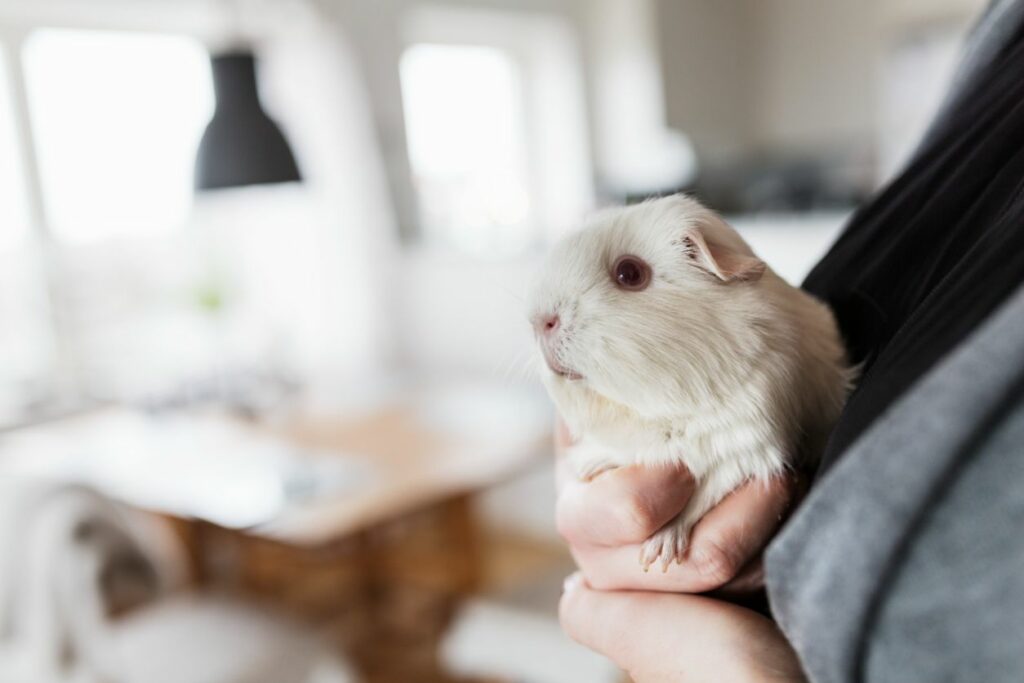Pets are often our best companions, and for many people, they are an essential part of their lives. Pets, specifically dogs and cats, have been recognized as emotional support animals (ESAs) for a long time.
However, there are other animals that can also serve as ESAs, including guinea pigs. In this blog post, we will discuss whether guinea pigs can be emotional support animals and everything you need to know about them.

What Are Emotional Support Animals?
Emotional support animals (ESAs) refer to animals that provide emotional support and companionship to people who suffer from emotional and mental disabilities.
ESAs can help people with depression, anxiety, PTSD, phobias, and other psychological disorders. ESAs provide comfort, love, and support to their owners, and they can help reduce stress and anxiety.
Legal Definitions and Requirements
Emotional support animals are not the same as service animals. Service animals are specifically trained to perform tasks for people with disabilities.
Emotional support animals, on the other hand, provide emotional support and companionship to people with mental disabilities.
There are no specific requirements for emotional support animals, but they must be prescribed by a licensed mental health professional.
Types of Emotional Support Animals
Dogs and cats are the most common types of emotional support animals. However, other animals can serve as ESAs, including birds, rabbits, and guinea pigs.
The type of animal chosen as an ESA depends on personal preference and the specific needs of the owner.
Benefits of Emotional Support Animals
Emotional support animals provide numerous benefits to their owners, including:
- Reducing stress, anxiety, and depression.
- Improving mood and emotional wellbeing.
- Encouraging social interaction and communication.
- Providing a sense of purpose and companionship.
Are Guinea Pigs Suitable as Emotional Support Animals?
Guinea pigs are a popular pet choice, and many people wonder whether they can serve as emotional support animals. Guinea pigs are small, gentle, and easy to care for, making them an excellent choice for people with mental disabilities.
Temperament and Personality Traits of Guinea Pigs
Guinea pigs are social animals that thrive on human interaction. They are gentle, affectionate, and form strong bonds with their owners. Guinea pigs are also very vocal animals and make a variety of sounds to communicate with their owners.
Advantages and Disadvantages of Guinea Pigs as Emotional Support Animals
Advantages:
- Guinea pigs are small and easy to care for, making them a good choice for people with limited space and resources.
- They are gentle and affectionate animals that form strong bonds with their owners.
- Guinea pigs are relatively quiet animals, making them a good choice for people who live in apartments or shared spaces.
Disadvantages:
- Guinea pigs require regular care, including feeding, cleaning, and veterinary care.
- They have a short lifespan of around five to seven years, which can be challenging for some owners.
- Guinea pigs can be timid animals, which may not be suitable for everyone.
How to Train Guinea Pigs as Emotional Support Animals?
Training guinea pigs as emotional support animals involves basic obedience training, socialization, and bonding techniques.
Basic Obedience Training
Basic obedience training involves teaching guinea pigs to respond to basic commands, such as coming when called and sitting on command.
Socialization and Habituation
Socialization and habituation involve exposing guinea pigs to different people, animals, and environments to help them adapt to new situations.
Techniques for Bonding with Guinea Pigs
Bonding techniques involve spending time with guinea pigs, providing them with treats and toys, and developing a strong bond and trust.
Conclusion: Are Guinea Pigs Good Choices as Emotional Support Animals?
Guinea pigs can be good choices as emotional support animals due to their gentle and affectionate nature. However, they require regular care and attention, and their short lifespan can be challenging for some owners.
Choosing a guinea pig as an emotional support animal requires careful consideration of personal preferences and the specific needs of the owner.
Personal Considerations for Choosing a Guinea Pig as an Emotional Support Animal
Choosing a guinea pig as an emotional support animal requires careful consideration of personal preferences and the specific needs of the owner. Some personal considerations include:
- The owner’s living situation and space availability.
- The owner’s ability to provide proper care and treatment.
- The owner’s preference for socializing with animals.
Alternatives and Resources for Emotional Support Animals
There are alternatives and resources available for emotional support animals, including:
- Therapy animals, such as horses and dogs.
- Support groups and counseling services.
- Online resources for finding emotional support animals and resources.
- How Long Do American Eskimo Dogs Live? Important Factors and Care Tips - September 29, 2023
- Do American Bulldogs Need Grooming? Essential Tips and Care Guidelines - September 29, 2023
- Do Bengal Cats Enjoy Playing? Essential Tips for Keeping Them Active - September 29, 2023